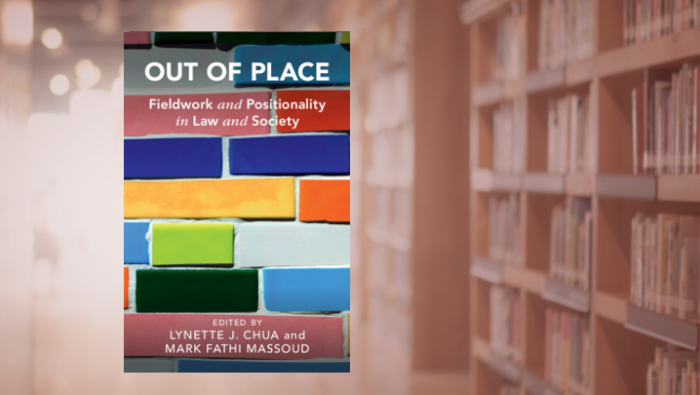
The Power and Pain of Positionality

‘… those of us who have been forged in the crucibles of difference … know that survival is not an academic skill … It is learning how to take our differences and make them strengths.’
What does it mean to reckon with and embrace being out-of-place as a Socio-Legal scholar? What pains, joys, and complexities might we encounter by confronting how our positionalities shape the knowledge we produce about law?
Lynette J. Chua and Mark Fathi Massoud’s Out of Place: Fieldwork and Positionality in Law and Society (2024) addresses these questions with depth and rigour. Offering reflections from law and society scholars across the globe, this collection is an important contribution to Socio-Legal Studies. It provides a rich discussion of what it means to live and work out-of-place: that is, to reckon with and embrace marginalised positionalities and account for the ways these shape our research. The experience of being out-of-place is contingent and fluctuating; it ‘slides in scales and shades’ (Chua, p. 104). As the authors in this collection show, it is an experience intimately interwoven with systemic oppression, injustices, feelings of not belonging, as well as acts of resistance.
Divided into nine chapters, Out of Place comprises contributions from early-career, mid-career, and established Socio-Legal scholars, all of whom have felt and reckoned with being out-of-place. Each has completed empirical fieldwork and contemplates their imbrication in power relations inside and outside the academy. Notably, every author within this collection shares aspects of their out-of-placeness and their identities, often within the first few pages of their contributions. Together, they demonstrate the ‘“position sensibility”’ Massoud skilfully advocates for within the Introduction: a commitment to confronting how our identities, ‘privileges’, and ‘vulnerabilities’ craft our Socio-Legal scholarship (p. 7, p. 29). Through its very form, Out of Place becomes a community of scholars in dialogue regarding marginalisation; a house with many rooms (its chapters) united by a shared commitment to honesty and a celebration of ‘fluidity, multiplicity, and ambiguity’ (p. 23). To a reader reckoning with out-of-placeness, the sharing of reflections and ‘rebellion’ against power relations feels like a coming-into-place (p. 3). This extension of community on the authors’ parts demands recognition.
Although Out of Place offers a multitude of Socio-Legal insights, two are particularly striking. First, that an ethic of community can arise from discussions of out-of-placeness; and second, an acknowledgement of the emotional life of Socio-Legal research.
First, Out of Place illuminates the relational nature of reflections concerning positionality (see, in particular: Abrego’s, Ballakrishnen’s, and Massoud’s chapters). Here, reflexivity concerning one’s positionality becomes a world-building act, rather than an individualistic pursuit. For example, in Chapter Two, Abrego offers profound contemplations on ‘research as accompaniment’ (p. 36, p. 51). Beginning by telling us that she is ‘a Salvadorian immigrant scholar in the United States’, Abrego traces her empirical work with migrant communities (p. 36). She artfully unravels the fiction of ‘minimized emotional entanglements’ when one has lived experience within and seeks to honour the community of people who make up ‘“the field”’ (p. 37). Demonstrating the imperative of ‘humanity’ (p. 41-53), Abrego’s chapter places connection at the heart of Socio-Legal research. In this way, the very act of Abrego’s writing becomes a walking alongside, rather than an erasure, instrumentalisation, or abstraction of the communities she has completed research with.
Second, Out of Place offers vital recognition of the emotional and ‘embodied’ aspects of Socio-Legal research, especially that of pain (Abrego, pp. 42-53). Mnisi Weeks’ and Baxi’s contributions are particularly instructive. Baxi’s account of undertaking fieldwork on rape trials in Ahmedabad in Gujarat is a powerful consideration of the challenges, stigmas, silences, ‘transgression’, and skill involved in navigating field sites imbued with violence (p. 125). ‘Wearing the color of law’ does not come without a price; Baxi recounts with refreshing honesty the painful afterlife of Socio-Legal research and its impacts ‘long after fieldwork is over’ (p. 120). In the context of her research in Msinga in South Africa, Mnisi Weeks provides a pathbreaking account of vicarious trauma and its ‘uncoordinated waves’, confronting the intersection of ‘well-being’, risk, identity, systemic violence, and out-of-placeness during and after fieldwork (p. 74, p. 57). These accounts permit us to bring our bodies and our emotional worlds, (frequently invisibilised and left out-of-place), into reflections on positionality and, vitally, into our analysis of law.
Indeed, the act of reading Out of Place is an emotional, embodied, and relational one: I laughed, cried, felt exhaustion, gratitude, shame, anger, and admiration. These responses are a testament to the integrity and sensitivity with which each author writes themselves into Out of Place. Just as Chua describes the building of a ‘home’ for ‘out-of-place discourse[s]’ through affective ties (p. 113), this edited collection forges a sense of community and legitimises new forms of knowledge from the openness and generosity of its authors. As Ballakrishnen writes, Audre Lorde long located ‘the logic of feeling and affect’ as method to split open old ways of knowing (p. 150, fn. 7). It is true that the focus of this volume is ‘qualitative, immersive’ Socio-Legal research (Boittin, p. 101). Rich avenues therefore remain for sustained reflection on the impact of being out-of-place across methodologies and fieldsites within Socio-Legal scholarship. In inviting each of us to consider our positionalities and how they influence the knowledge we produce, this book is an indispensable guide for generating richer accounts of law’s power.

